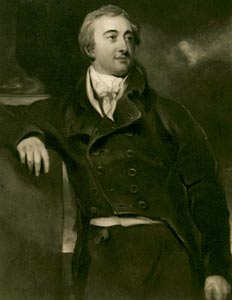Biography of Lord William Henry Cavendish-Bentinck (1774-1839; M.P. and Governor General of India)
- [Hans] William Bentinck, 1st Earl of Portland (1649-1709)
- [William] Henry Bentinck, 1st Duke of Portland (1682-1726)
- William Bentinck, 1st Count Bentinck (1704-1774)
- Charlotte Sophie, Countess Bentinck, née Countess of Aldenburg (1715-1800)
- William Bentinck, 2nd Duke of Portland (1709-1762)
- Margaret Cavendish-Bentinck, Duchess of Portland (1715-1785)
- John Albert Bentinck (1737-1775; naval captain and M.P.)
- William Henry Cavendish Cavendish-Bentinck, 3rd Duke of Portland (1738-1809)
- William Bentinck (1764-1813; Vice-Admiral)
- William Henry Cavendish-Scott-Bentinck, 4th Duke of Portland (1768-1854)
- Lord William Henry Cavendish-Bentinck (1774-1839; M.P. and Governor General of India)
- William John Cavendish-Bentinck-Scott, 5th Duke of Portland (1800-1879)
- Lord [William] George Frederic Cavendish-Scott-Bentinck (1802-1848)
- Lord [William] Henry Cavendish-Bentinck (1804-1870)
- William John Arthur Charles James Cavendish-Bentinck, 6th Duke of Portland (1857-1943)
- Winifred Anna Cavendish-Bentinck, Duchess of Portland (1863-1954)
- William Arthur Henry Cavendish-Bentinck, 7th Duke of Portland (1893-1977)
- Ferdinand William Cavendish-Bentinck, 8th Duke of Portland (1888-1980)
- Victor Frederick William Cavendish-Bentinck, 9th Duke of Portland (1897-1990)
- Henry Noel Bentinck, 11th Earl of Portland (1919-1997)
- Timothy Charles Robert Noel Bentinck, 12th Earl of Portland (b 1953)
Lord William Bentinck was born in London, the second son of the 3rd Duke of Portland. He was educated at Rev. Dr Samuel Goodenough's school in Ealing, before moving on to Westminster School. After completing his education, he embarked on a military career, moving swiftly up the ranks on account of his family's influence and his ability to purchase commissions.
In 1799, Lord William went to Italy, where he served for two years as liaison officer with the Austro-Russian forces. In 1801 he embarked for Egypt to command the cavalry, but saw no active service. His star continued to rise with his appointment, in 1803, as Governor of Madras. The appointment had been secured largely by the lobbying of his father, but was not popular with the East India Company and the Board of Control. Lord William had a number of significant achievements in India, but his work was largely overshadowed by the mutiny at Vellore in July 1806. He left his post in 1807.
In 1808 he served in the Battle of Corunna and by 1811 had been appointed envoy to the Court of the Two Sicilies. From here, he promoted plans for an independent and united Italy, until he was recalled to Britain in 1815.
After a period at home in Britain when he served as a commissioner for drainage and navigation in the fens, he returned to India in 1828 as Governor General - a post which he then held until 1835. In this role he undertook sweeping social, economic and political reforms which, it has been argued, laid the foundations for modern India.
Like many other members of his family, Lord William was also a politician. In 1796 he was elected M.P. for Camelford in Cornwall, and a short time later he exchanged this seat to become M.P. for Nottinghamshire, serving from 1796-1803, 1812-1814 and 1816-1826. He later served as M.P. for King's Lynn and Glasgow. He was not an active politician, however, speaking infrequently in the House of Commons, partly because he was frequently absent from the country and partly because of his dislike of public speaking.
Images

Lord William Henry Cavendish-Bentinck
Family
In 1803 he married Lady Mary Acheson (d 1843), daughter of the 1st Earl of Gosford. They had no children.
Archive Collections
Published Sources
- Ahmad, Manazir, Lord William Bentinck (Allahabad, 1978)
- Azariah, Isaiah, Lord Bentinck and Indian education, crime, and status of women (Washington, 1978)
- Azariah, Isaiah, Lord Bentinck and Indian social reforms (1997)
- Boulger, D.C., Lord William Bentinck (Oxford, 1892)
- Gupta, Maya, Lord William Bentinck in Madras and the Vellore mutiny, 1803-7 (New Delhi, 1986)
- Joshi, J. C., Lord William Bentinck : his economic, administrative, social and educational reforms (New Delhi, 1988)
- Mukherjee, Sipra, Indian administration of Lord William Bentinck (Calcutta, 1994)
- Philips, C.H. (ed.), The correspondence of Lord William Cavendish-Bentinck governor-general of India, 1819-1835, 2 vols. (Oxford, 1977) [King's Meadow Campus Ref DS475.8.B4]
- Ray, Ajit Kumar, Widows are not for burning: actions and attitudes of the Christian missionaries, the native Hindus, and Lord William Bentinck (New Delhi, 1985)
- Roselli, J., Lord William Bentinck and the British occupation of Sicily, 1811-1814 (Cambridge, 1956) [King's Meadow Campus Ref DA536.B4.R6]
- Roselli, J., Lord William Bentinck: the making of a liberal imperialist 1774-1839 (Berkeley, 1974) [King's Meadow Campus Ref DA536.B4.R6]
University Theses
- Barrett, C.E., Lord William Bentinck in India, 1828-1835 (Oxford University DPhil. Thesis, 1954)
- Pandey, Kailash Narain, Lord William Bentinck and the Indian states, 1828-1835 (University of London PhD Thesis, 1957)